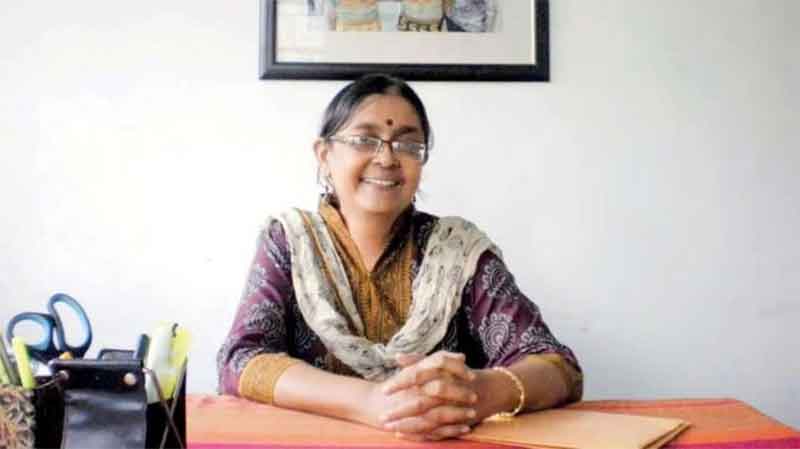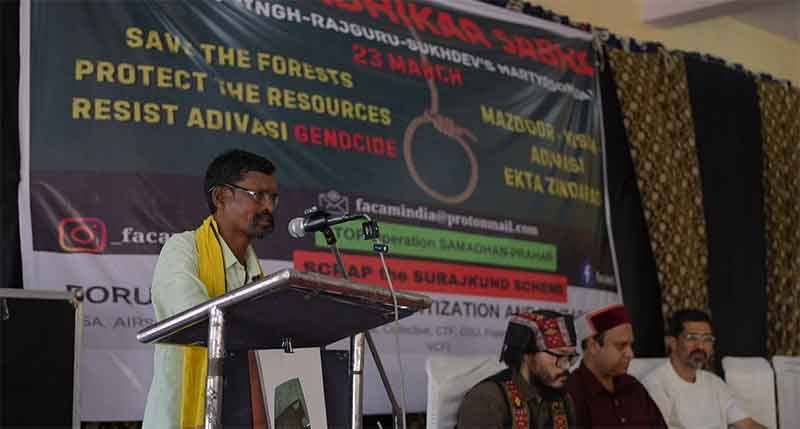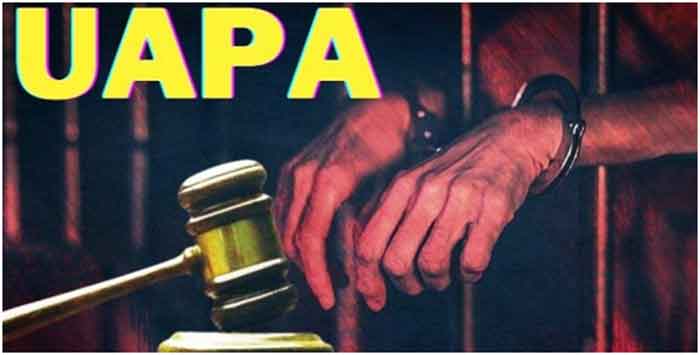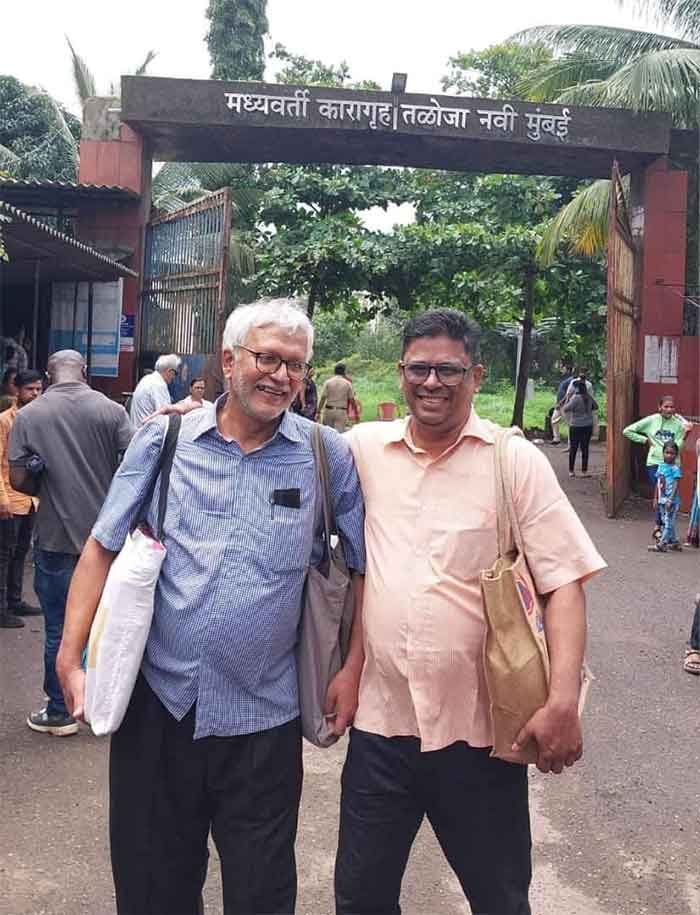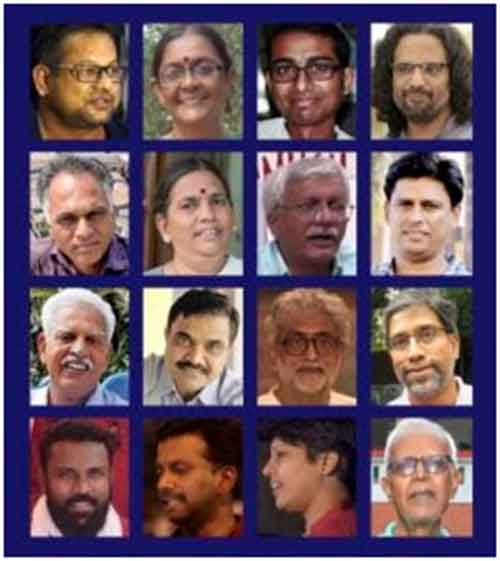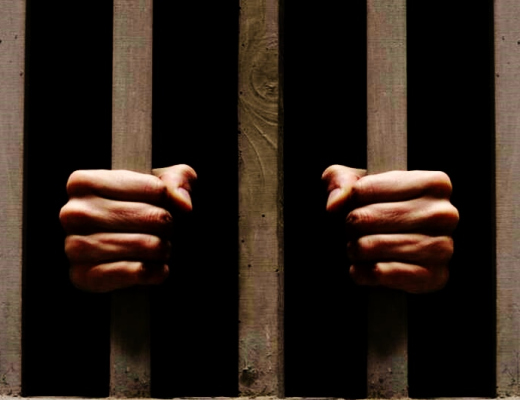
To the world India is known as the largest democracy in the world. If you considered holding elections at regular interval as the only criteria of being a democracy you can give this tag. But, the dismal condition of freedom of speech and the right to dissent in the country is a real cause of concern for the activists and other freedom loving people.
The latest ranking released by the press freedom index puts India at 142. The use of draconian anti-terror laws to suppress any form of opposition is becoming new-normal day by day
Before 1947, When India used to be ruled as a part of the British Empire, any voice, which could have shaken the existence of tyranny of the rulers was being subverted ruthlessly, using anti-sedition acts (Section 120 to section 124B of the Indian Penal Code, 1860). As many freedom fighters from different lines of ideologies were executed or incarcerated by the use of these provisions, including Gandhi, it was widely anticipated that the acts related to sedition will be done away with, owing to its heavy use to suppress dissent. But the government under Jawaharlal Nehru failed to stand up to that expectation, and the sedition act remained intact.
Not only it retained its status in the penal code, in fact the post-colonial regimes have been regularly identified with the use of this act to suppress dissent against the government.
Interestingly, the original rulers who had implemented this act in India, i.e. the British government, have repealed this law in United Kingdom declaring these offenses to be “…from a bygone era when freedom of expression wasn’t seen as the right it is today…”
However, the feeling was not the same for the Indian establishment. For example, we can found a First information report filed the police of Khunti District in the Indian state of Jharkhand, which showed 10,000 people as accused for seditious activity. However, in reality, they were participating in a movement named a Pathalgadi movement, where the villagers erected stone engraving of the 5th Schedule of the constitution (provision for the protection of the tribal population), protesting the government highhandedness in the question of tribal rights.
However, sedition act is not the only legal provision that exists in India. There is the anti-terror laws like Unlawful Activities (Prevention) Amendment Act,2019; Chhattisgarh Special Public Security Act,2005; Jammu and Kashmir Public Safety Act,1978; National Security Act,1980 etc. which continues to be in effect and used heavily to crackdown all the critical voices. There were a few law like Terrorist and Disruptive Activities (prevention) Act, 1985 and Prevention of Terrorism Act,2002 which was in force but later repealed after widespread criticisms.
The UA(P)A: Past, Present and the Future of Arrested Dissent
In 1963, the Constitution (Sixteenth Amendment) Act , empowered the government to legally impose restrictions on several fundamental rights, viz. Freedom of Speech, Right to assemble peaceably and without arms and Right to form Associations or Unions, in the ‘national interest’.
This constitutional amendment paved the way to the enactment of the Unlawful Activities Prevention Act, 1967. It was the first of its kind to be formulated in Independent India (if we take the sedition act as a colonial inheritance). Through the decade of 1970 it was heavily used to suppress the revolutionaries related to Naxalbari Movement (later they went on to be known as Naxalites).
Through the decades this act went through several rounds of amendments, last one being in 2019, only to make it more stringent. In the latest administration the act empowers the government to designate any individual as terrorist without trial. Not only it has opened new avenues for the government to harass the opposition voice, it is literally a violation of the right to have a fair trial. Under this act a person can be detained for a period of 180 days without bail or without filing charge sheet.
Since the beginning of movement against the new Citizenship Act and the proposed “National Register of Citizen”, UA(P)A has been used heavily to suppress the voices of the protesting activists and the students. Notably this two new steps taken by the government has been seen as threat to the citizenship status of the minorities (especially, people from the Muslim community). In January, a research scholar, Sharjeel Imam, was arrested under UA(P)A for giving provocative speeches which was perceived by the government to be of seditious in nature.
Since then he continues to be incarcerated and was denied bail. After the lockdown started due to the COVID-19 pandemic, two student activists from the Jamia Milia Islamia University, Meeran haider and Safoora Zargar, was arrested under the same act, completely disregarding the COVID-19 threat to pregnant Safoora and her yet unborn Baby. On 16th May, 2020, another Student of JMI was booked under this act. In between this arrested student activists, Sharjeel Imam, was infected with COVID-19. However, still he continues to be in prison.
The Bhima Koregaon Case: a Prototype Case Of Suppression of Dissent in India
Apart from the cases related to the anti-CAA anti-NRC movement, the infamous Elgar Parishad case or better known the Bhima Koregaon conspiracy case is another example of the suppression of dissent. In 2018, Violence was unleashed by the upper Caste Marathas, on the Dalit’s who converged at the village of Bhima Koregaon in the Indian state of Maharashtra to commemorate the Bi-centenary of the win over the marathas.
In the aftermath, a FIR was lodged naming Sambhaji Bhinde and Milind Ekbote of the ruling party BJP for instigating the violence. But later on, their names were absolved from the case, and activists Surendra Gadling, Sudhir Dhawale, Rona Wilson, Shoma Sen and Mahesh Raut was arrested for instigating riot and alleged connection with the banned Communist Party of India (Maoist). Subsequently, they were charged under various sections of the Unlawful Activities (prevention) Act. Later in the same year, four more activists including Octogenarian poet Varavara Rao, artist and activist Arun Ferreira, lawyer Sudha Bharadwaj, Gautam Navlakha and Vernon Gonsalves were arrested under the same case.
Later on the government went on to claim, these activists were associated some grand conspiracy for “the assassination of the Prime minister” based on some farcical evidences. Now, two years into the case, trial haven’t commenced yet. Though the Supreme Court categorically asked the authority’s to decongest the Jails, these activists were never given respite. Ailing 81 year old Activist-poet Varavara Rao was repeatedly denied bail, and got medical attention only after the intervention of the National Human Rights Commission, that too once he was severely ill and was diagnosed with COVID-19. The others are detained at overcrowded prisons, where COVID outbreak has started.
Violations Under UA(P)A
Apart from this highlighted prisoners, there are a number of prisoners in different parts of the country, who continues to be imprisoned without completion of trial, some for more than a decade. Interestingly, the rate of acquittal at the completion of the case stands at 67%, i.e. most of the imprisoned accused were proven not guilty of the alleged offense.
According to the last available report of the National Crime Records Bureau the number of cases under various sections of the UA(P)A have increased from 901 in 2017 to 1182 at the end of 2018. To mention another example the professor of Delhi University GN Saibaba, who is suffering from severe health conditions and 90 percent physical disability, continues to be in prison in inhuman conditions, considering the fact that he can’t even do his daily chores without assistance.
As, we mentioned before the latest amendment of the act enables the government to designate individuals as terrorists without trial, also empowers the Director General of the National Investigation Agency to forfeit the property of that individual.
This clause is a violation of the principal of “innocent until proven guilty” and also violates the International Covenant on Civil and Political rights.
Several critiques have reported this act to be in contrary to the Articles 14 (Right to Equality), 19 (right to freedom of speech) and 21 (right to life) of the Indian Constitution. According to a Public Interest Litigation (PIL) filed by Sajal Awasthi, this is a violation of the right to reputation which is an intrinsic part of right to life with dignity.
Like the Sedition act, the Unlawful activities (prevention) act, have been used systematically to deprive the population of their Rights. The example like, villagers protesting eviction by the government or the corporate companies from their ancestral place getting booked under this act isn’t uncommon.
After august 5, 2019, as Kashmir’s internet connections were snapped, youths were arrested under the same act trying to access web using VPN. After the rise of Neo-fascist regime under the Hindu Nationalist Bharatiya Janata Party, cases have increased by many folds under these charges, and many activists were booked for expressing their anti-government dissent. While, several people have filed lawsuits against this act, international community must take cognizance of the rampant civil and political rights violations under this legislation, and take some fruitful steps.
Under domestic and International pressure India has withdrawn acts like Terrorist and Disruptive Activities Act and Prevention of Terrorism Act in the past. Though most of the provisions of those acts have been included in the current anti-terror laws, and in the latest amendments it was quite outstanding being more stringent than the previous ones.
Draconian Acts Continue Far Beyond UA(P)A
Other than UA(P)A, the acts like Jammu and Kashmir Public safety act and the Chhattisgarh special public security act are the once rampantly used to disrupts all kinds of protest and demonstrations against the government, specifically in the areas like Chhattisgarh and Jammu and Kashmir. In Jammu and Kashmir, as we all know, a movement is going on for the right to self-determination. Being one of the most densely militarized zones in the world, the democratic space is already very narrow in that region.
This Public safety act provides scope the government to detain any citizen deemed to be disruptive to the law and order and hold them in captivity for 12 months without trial. In Kashmir Valley, Some thousands of people ranging from ex-chief ministers of the state to teenagers was held by this act according to the latest reports, many of them being minor. Under a similar kind of act in force in the State of Chhattisgarh several people are/were imprisoned for several years.
For example, Dr. Binayak Sen, a doctor working with the tribal population of the state was booked under CSPSA 2005. Another teacher and activist Soni Sori was booked under this act and was severely tortured in custody. Though due to mounting pressure she was released, the officer responsible for her torture was given a medal of excellence instead of being punished.
Grim Future of India’s Democracy
After the COVID-19 outbreak started in the country, many of these political prisoners including Sharjeel Imam and Varavara Rao were tested positive. Especially, the elderly prisoners with multiple ailments have been denied of bail, even on the ground of ailing health.
The government is not only flouting the declaration of universal human rights, it is also showing a complete disregard to the articles of its own constitution. Recently, the arrest of Delhi University professor Hany Babu in connection with the Bhima Koregaon Case, shows that the government is in no mood to stop the crackdown on dissent.
The struggle for these civil and political rights in India is in severe need of the global attention. The world community must look beyond the tag of world largest democracy, and protest the dismal conditions of political and civil rights in India under the draconian law regime, otherwise the time is not much far, when you have to call the world’s largest Democracy as world’s largest open-air prison.
Arka Deep is an activist and freelance writer based in India
SIGN UP FOR COUNTERCURRENTS DAILY NEWSLETTER


